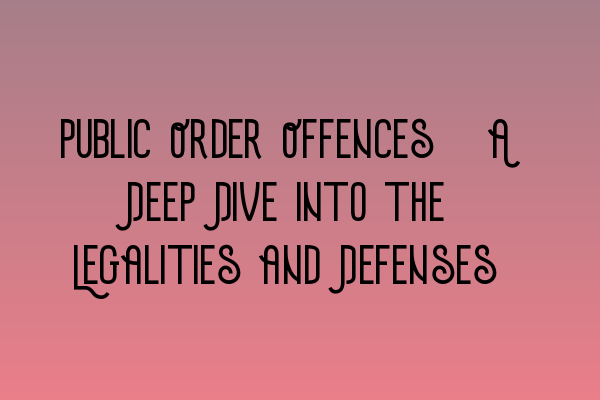Public Order Offences: A Deep Dive into the Legalities and Defenses
Public order offences encompass a wide range of criminal activities that disrupt, disturb, or endanger public peace and tranquility. These offences are taken very seriously by the law, as they have the potential to cause significant harm to society and individuals.
The Legalities of Public Order Offences
Public order offences are governed by various laws and statutes in the UK, including the Public Order Act 1986. This Act defines and classifies offences such as public disorder, affray, and threatening, abusive, or insulting behavior. It sets out the legal requirements for establishing guilt and prescribing penalties for those convicted.
Public disorder involves intentionally causing harassment, alarm, or distress to others with the intent to provoke violence or serious disorder. Affray, on the other hand, is committed when one or more persons use or threaten violence towards each other, causing others to fear for their safety. Threatening, abusive, or insulting behavior pertains to acts that are intended or likely to cause harassment, alarm, or distress to others.
When charged with a public order offence, it is essential to consult with a qualified criminal solicitor who specializes in this area of law. They will guide you through the legal process, explain your rights, and build a strong defense strategy.
Possible Defenses Against Public Order Offences
Defendants accused of public order offences have the right to present a defense in court. Several defenses may be applicable, depending on the circumstances of the case. Here are a few commonly used defenses:
- Self-Defense: If the defendant can prove that their actions were necessary to protect themselves or others from imminent harm, self-defense can be a valid defense strategy.
- Mistaken Identity: If the defendant can provide evidence that they were not present at the scene of the alleged offence, or that they were mistaken for someone else, they can argue mistaken identity as a defense.
- Lack of Intent: Public order offences often require proof of intent or knowledge. If the defendant can establish that they did not intend to cause harassment, alarm, or distress, it may be a valid defense.
- Freedom of Expression: In some cases, the defendant may argue that their actions or speech were protected under the right to freedom of expression. However, the court will determine if the expression exceeded lawful limits.
It is crucial to note that each case is unique, and the availability and success of these defenses will depend on the specific facts and evidence presented.
Seeking Legal Representation
If you have been charged with a public order offence, it is imperative to seek expert legal representation. A skilled criminal solicitor will assess the details of your case, explore all available defenses, and strive to achieve the best possible outcome for you.
At SQE Criminal Law & Practice Law UK, our team of experienced solicitors specializes in criminal law and is well-versed in public order offences. We understand the intricacies of these cases and are dedicated to providing you with exceptional legal representation.
For more information about criminal law or related topics, we invite you to read our other articles:
- Legal Representation for Delaware LLCs in the UK: Expert Advice
- Ensuring Ethical Business Practices: Delaware’s Code of Conduct
- Legal Challenges for UK Businesses in the U.S.: Strategies for Overcoming Hurdles
- Legal Challenges for UK Businesses in the U.S.: Strategies for Overcoming Hurdles
- SQE Exam Prep: Essential Study Materials for Aspiring Solicitors
Contact SQE Criminal Law & Practice Law UK today for a confidential consultation and let our experienced legal team assist you in navigating the complexities of public order offences.
